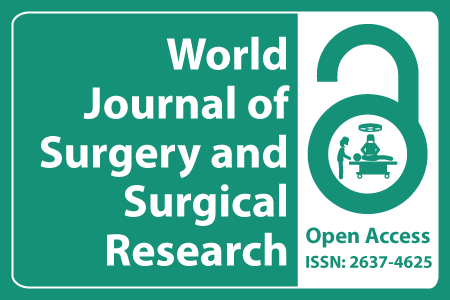
Journal Basic Info
- Impact Factor: 1.989**
- H-Index: 6
- ISSN: 2637-4625
- DOI: 10.25107/2637-4625
Major Scope
- Hepatology
- Surgical Procedures
- Cardiothoracic Surgery
- General Surgery
- Surgery & Surgical Research
- Oral & Maxillofacial Surgery
- Transplant Surgery
- Neurological Surgery
Abstract
Citation: World J Surg Surg Res. 2024;7(1):1551.DOI: 10.25107/2637-4625.1551
Gastric Body Adenocarcinoma after Laparoscopic Sleeve Gastrectomy (LSG): Are Really Needed the Postoperative Endoscopy and a Correct Follow Up after Bariatric Surgery?
París Sans M, Sánchez Cano JJ, Vives Espelta M, Bartra Balsells E, Trinidad Borràs A, Hernàndez Gonzàlez M, Raga Carceller E, García Duran MA, Sabench Pereferrer F and Del Castillo Déjardin D
Department of Bariatric and Metabolic Surgery, University Hospital of Sant Joan, Spain
Department of Surgery, Faculty of Medicine, IISPV, “Rovira i Virgili” University, Spain
Esophagogastric Surgery Unit, General Surgery Service, University Hospital of Sant Joan, Spain
*Correspondance to: Daniel Del Castillo Déjardin
PDF Full Text Research Article | Open Access
Abstract:
Gastric body cancer after bariatric surgery is rare. Premalignant lesions in preoperative Esophagogastroduodenoscopy (EGD) should warn of the risk of excluding the gastric body with derivative techniques. A case of 51-year-old woman is presented, who suffered severe obesity (BMI 51 kg/m2), arterial hypertension, SAHS, fibromyalgia, depressive syndrome and psoriasis. Preoperative EGD without alterations (biopsies: Chronic gastritis with moderate activity, complete intestinal metaplasia and positive Helicobacter pylori). Laparoscopic Sleeve Gastrectomy (LSG) was performed with adequate weight loss over 2 years (BMI 35 kg/m2, TWL 31%) and resolution of comorbidities. Due to progressive weight recovery, revisional surgery was proposed. Incisura angularis tumor was detected in EGD (biopsy: High-grade dysplasia). CT ruled out local infiltration and metastasis. The symptoms had started 3 months before EGD. A D1 Subtotal Gastrectomy with laparoscopic Roux-Y reconstruction was performed (Pathological anatomy: Adenocarcinoma of intestinal type pT1apN0 on a 60 mm adenoma with free margins). Not adjuvant treatment was required. Scientific societies advise all patients undergoing bariatric surgery to undergo a preoperative EGD; as well as in the postoperative period of patients at risk of gastric cancer. Despite this, routine postoperative EGD remains a mild recommendation with a low level of evidence. IFSO and ASMBS advise the performance of postoperative EGD in all patients undergoing LSG surgery until the actual risk of gastric cancer in these patients is determined. Early detection can avoid the need for adjuvant treatment or distant lesions. It is essential to report all cases to create clinical guidelines with a higher level of scientific evidence.
Keywords:
#
Cite the Article:
París Sans M, Sánchez Cano JJ, Vives Espelta M, Bartra Balsells E, Trinidad Borràs A, Hernàndez Gonzàlez M, et al. Gastric Body Adenocarcinoma after Laparoscopic Sleeve Gastrectomy (LSG): Are Really Needed the Postoperative Endoscopy and a Correct Follow Up after Bariatric Surgery?. World J Surg Surgical Res. 2024; 7: 1551..













